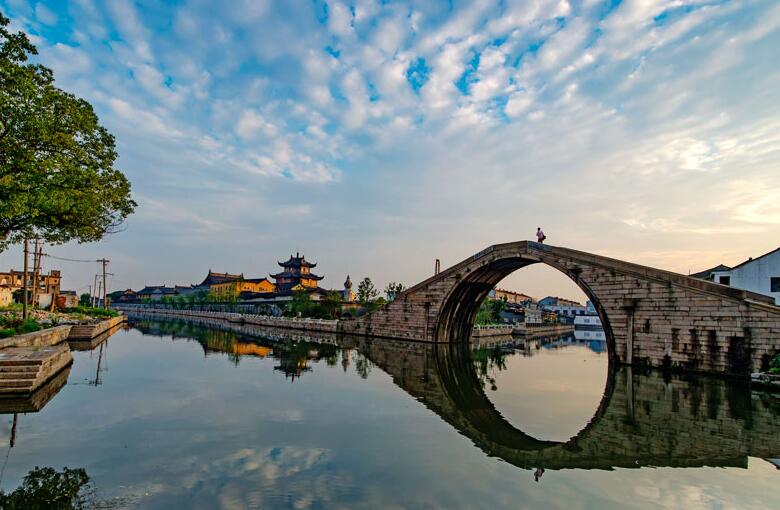"A pulsating ancient canal town, a flowing Wu and Yue epic" - Pingwang is a historic town along the Beijing-Hangzhou Grand Canal that is rich in culture. Located in the Wujiang District of Suzhou, Jiangsu Province, the township is also known as "Zhong Lu" and "Xiao Feng Bridge". Pingwang is 95 kilometers away from Shanghai, 55 kilometers from Huzhou and 35 kilometers from Suzhou. It is at the forefront of the economic fringes of Jiangsu, Zhejiang and Shanghai, and is one of the important hubs in the Yangtze River Delta. The town has a total area of 133.5 square kilometers, 2 administrative offices, 21 administrative villages, 7 district committees and a population of 83,000 residents.
As a cultural heritage town of Jiangsu Province, Pingwang's history dates back to 5,200 years ago when the ruins of the Longnan villages shone with the wisdom of Pingwang’s ancestors during the period of Liangzhu Culture. Named during the Western Han Dynasty, Pingwang was a designated station during the Tang Dynasty and was officially constructed during the Hongwu reign of the Ming Dynasty (AD 1368). Pingwang’s cultural heritage is evident in its splendid historic relics. At present, the town maintains 10 key protected cultural relics and 32 historic sites. Among them, An-min Bridge and An-de Bridge are considered "World Cultural Heritage", “Important Historical Monuments under Special Preservation” and relics of the Beijing-Hangzhou Grand Canal.
Pingwang has been acquainted with numerous outstanding and famous persons throughout history. Renowned poets Fan Li, Yan Zhenqing, Zhang Zhihe, Yang Wanli and Lu You etc had left behind popular poems in Pingwang. Since the Ming and Qing dynasties, countless accomplished persons have been known to be Pingwang natives or have settled in the township, including Wu Qiongxian (celebrated female poet during the Qianlong period), Lang Yinzhao (imperial concubine during the Xianfeng, Tongzhi and Guangxu period), Tai Xuan (renowned monk), Tang Changhuan (contemporary historian), Huang Wenxi (academician at the Chinese Academy of Sciences) and Ni Zhengyu (Judge of the Tokyo Trial).
Enriched by the Grand Canal, Pingwang enjoys rich produce, a well-developed agricultural industry and amazing ingredients. These advantageous factors created its famous specialties: silver fish, ice cream, hot spicy sauce and malt cake etc. Their simple yet rich tastes never fail to linger on the tongues of visitors. In addition, tourists are often enticed by Pingwang’s unique traditional customs and skills such as Pingwang riddles, Pingwang songs, hot sauce preparation techniques etc, which have been included in the list of provincial and municipal intangible cultural heritage.
Pingwang town boasts of several historic monuments and picturesque scenery. It possesses both the exquisite features of a southern water village as well as the simplicity of the Wu and Yue periods. Its river, lake, streets, bridges, temples and gardens are full of appeal. The beautiful Yingying Lake is said to have been one of the five lakes visited by Fan Li during the Spring and Autumn Period, earning it the beautiful description of "Pinghu Autumn Moon" while the ancient An-de Bridge forms a majestic sight over the Grand Canal. The ancient little Jiuhua Temple is where the renowned Master Taixu became a monk and marks the spread of Buddhism over hundreds of years. With its whitewashed walls and dark roofs, quaint houses, meandering waterways and tasteful marketplace, Pingwang manages to retain the graceful bearing of an ancient water town.
In recent years, Pingwang Town has taken a new position in building a strong hub by working with various partners to create the "Five Major Vehicles", namely the Yinghu Cultural Tourism Zone, Efficient Agricultural Demonstration Park, Pingnan Industrial Zone, Guowang Hi-Tech Industrial Park and Zhongbi Technology Park. At the same time, Pingwang shall further strengthen the conservation of its natural landscape and cultural heritage, and systematically integrate and develop tourism resources for the rapid development of Pingwang’s tourism.
Looking forward, Pingwang shall focus on its "canal culture" to seek the balance between traditional industries and tourism development. It shall combine the industrial advantages of a "Chinese Textile Town" to drive the constant improvement of tourism quality, hence optimizing the environment for tourism development as well as the living environment for its residents. Pingwang shall spare no effort in creating its unique brand and personality, to become a "canal culture travel and leisure destination" that is perfect for living, business, culture and tourism.
